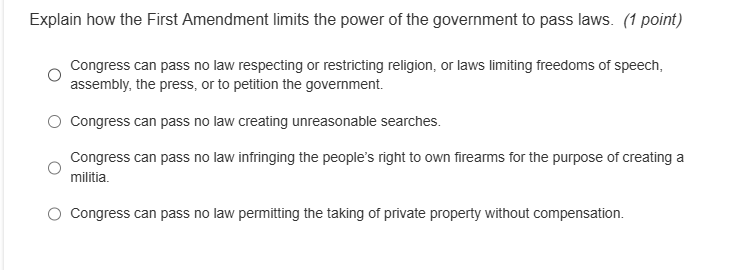Explain how the First Amendment limits the power of the government to pass laws.

Understand the Problem
The question is asking to explain how the First Amendment restricts the government's ability to enact laws, specifically focusing on various protections such as freedom of religion, speech, assembly, and petition. It provides multiple options related to legislative limits imposed by the First Amendment.
Answer
Congress can pass no law respecting or restricting religion, or laws limiting freedoms of speech, assembly, the press, or to petition the government.
The First Amendment limits Congress from passing laws respecting or restricting religion, or laws limiting freedoms of speech, assembly, the press, or to petition the government.
Answer for screen readers
The First Amendment limits Congress from passing laws respecting or restricting religion, or laws limiting freedoms of speech, assembly, the press, or to petition the government.
More Information
The First Amendment is a fundamental part of the U.S. Constitution that protects various freedoms essential to democracy.
Tips
Ensure to differentiate between the protections offered by different amendments.
Sources
- First Amendment | Wex | US Law | LII / Legal Information Institute - law.cornell.edu
- U.S. Constitution - First Amendment | Resources | Library of Congress - constitution.congress.gov
AI-generated content may contain errors. Please verify critical information